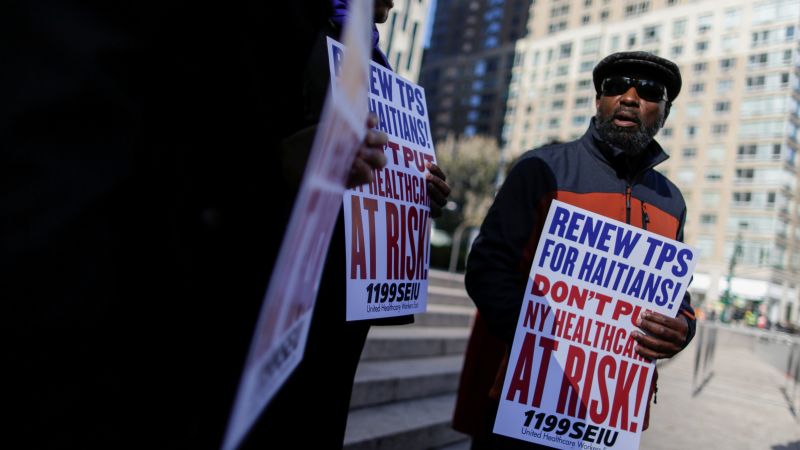A federal judge in Brooklyn has blocked the Trump administration’s attempt to prematurely terminate temporary protected status (TPS) for Haitian migrants. The decision, issued by U.S. District Judge Brian Cogan, determined that the Department of Homeland Security (DHS) violated legal procedures in its haste to revoke deportation protections and work permits for over half a million individuals.
The ruling arrives after DHS, under Secretary Kristi Noem, rescinded former President Joe Biden’s 18-month extension of Haiti’s TPS designation earlier this year. Initially extended through February 3, 2026, the Trump administration aimed to cut the designation short, first setting a new end date of August 3, and then adjusting it to September 2. Judge Cogan’s decision emphasized that Secretary Noem did not adhere to the timeline and procedures mandated by Congress, including a necessary review of current conditions in Haiti before ending TPS.
Legal and Humanitarian Implications
Judge Cogan’s ruling stated, “Secretary Noem does not have statutory or inherent authority to partially vacate a country’s TPS designation,” and concluded that her actions were unlawful under the Administrative Procedure Act. He further noted that the plaintiffs’ injuries were “actual and imminent,” and could not be remedied by monetary damages. If the partial vacatur remained, plaintiffs would lose their right to live and work in the United States, based on what the court found to be an unlawful action.
The lawsuit, initiated in March by nine Haitian TPS holders and advocacy groups such as the Haitian Evangelical Clergy Association and Service Employees International Union 32BJ, argued that the abrupt policy shift disrupted lives and forced families to prepare for deportation much earlier than anticipated. Cogan, a George W. Bush appointee, indicated that the plaintiffs are likely to succeed on the merits and ordered the government to maintain Haiti’s TPS designation until at least February 2026, unless it is lawfully terminated.
Broader Context and Historical Parallels
The TPS program, established in 1990, provides temporary immigration status to nationals of countries experiencing armed conflict, environmental disasters, or other extraordinary conditions. Haiti was initially granted TPS following the devastating earthquake in 2010, which left the nation struggling with widespread destruction and instability.
This legal battle is not isolated. A related case, Haitian Americans United Inc. v. Trump, is concurrently unfolding in federal court in Massachusetts, raising similar claims against the premature termination of TPS for Haitian nationals. The outcomes of these cases could set significant precedents for the treatment of TPS holders from other nations.
Expert Opinions and Future Implications
Immigration experts and advocates have lauded Judge Cogan’s ruling as a critical safeguard for Haitian migrants. “This decision underscores the importance of adhering to legal processes and recognizing the humanitarian needs of vulnerable populations,” said Maria Rodriguez, an immigration policy analyst.
Meanwhile, the DHS has yet to comment on the ruling. The agency retains the ability to end Haiti’s TPS designation in the future, provided it complies with statutory requirements. This decision, however, reinforces the necessity for thorough reviews and adherence to legal protocols before making such determinations.
As the legal proceedings continue, the lives of hundreds of thousands of Haitian migrants hang in the balance. The court’s decision ensures a temporary reprieve, but the broader debate over immigration policy and humanitarian protections remains a contentious issue in the United States.
With the legal landscape evolving, stakeholders on all sides are closely monitoring the situation, aware that the implications of these rulings could extend beyond the immediate case, potentially influencing immigration policy and practices nationwide.
About The Author
 The Complex Dynamics of Late Capitalism: Control, Crisis, and Compliance
The Complex Dynamics of Late Capitalism: Control, Crisis, and Compliance MAGACOIN FINANCE Joins Solana and Chainlink on Analyst Picks for Q4 2025
MAGACOIN FINANCE Joins Solana and Chainlink on Analyst Picks for Q4 2025 Paramount Settles Trump Lawsuit Over ’60 Minutes’ Edits for $16 Million
Paramount Settles Trump Lawsuit Over ’60 Minutes’ Edits for $16 Million Green Brick Partners’ Q2 2025 Earnings Forecasted by B. Riley Analysts
Green Brick Partners’ Q2 2025 Earnings Forecasted by B. Riley Analysts Aardvark Therapeutics Gains Momentum with HC Wainwright’s “Buy” Rating
Aardvark Therapeutics Gains Momentum with HC Wainwright’s “Buy” Rating